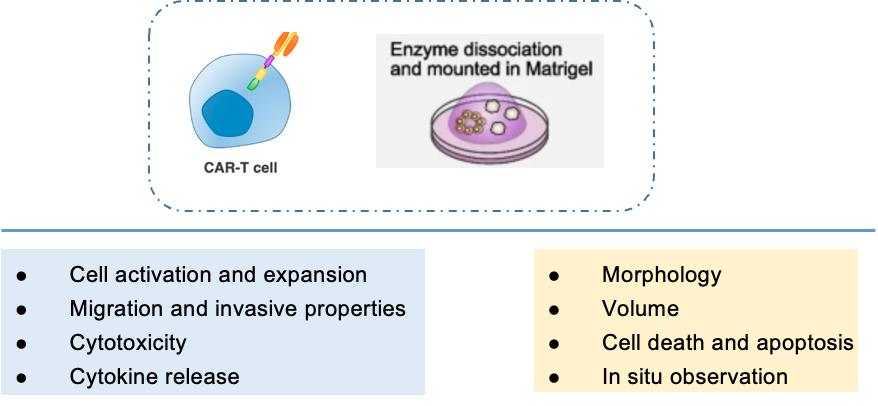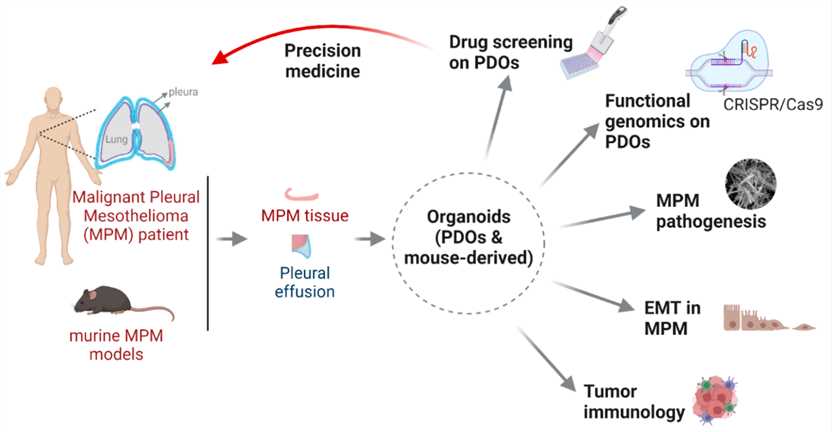All products and services are For Research Use Only and CANNOT be used in the treatment or diagnosis of disease.
Mesothelioma (MM) is commonly derived from mesothelium tissue of the lung and chest wall after exposure to crisis asbestos. Malignant mesothelioma is of low incidence, but heterogeneous and aggressive cancer. There is limited clinical treatment for MM with minimal effects. A sound preclinical model is critical to understand tumor biology and developing new therapeutic strategies. An organoid model is a 3D cell culture system that stands between 2D cell lines and in vivo animal models. Cancer organoids recapitulate the major alterations in molecular that mediate tumor cell resistance to clinical treatment. Furthermore, different types of cell components of tumors can be retained or introduced to organoid models to partially reproduce tumor microenvironment and hinder therapeutic drugs and cell migration. Cancer organoids are a popular preclinical tool for potential immunotherapy development and assessment.
Creative Biolabs provides a panel of well-characterized Malignant mesothelioma cancer organoid models that mirror the mutation characters and heterogeneity of human tumor tissues to predict the responses of CAR-based cell therapies.
 Fig.1 Schematic illustration of the main steps for mesothelioma cancer organoids production from mouse tumor tissue. (Gao, et al., 2022)
Fig.1 Schematic illustration of the main steps for mesothelioma cancer organoids production from mouse tumor tissue. (Gao, et al., 2022)
Advanced multi-omics techniques and accurate histopathological methods are used to analyze human patients' tissues and various pathway-derived cancer organoids.
Category
Techniques
Function
The advanced preclinical cancer organoid models are useful to test the anti-tumor activity of promising immunotherapies in vitro.

 Fig.2 Malignant mesothelioma cancer organoids are a useful tool for preclinical studies. (Gao, et al., 2022)
Fig.2 Malignant mesothelioma cancer organoids are a useful tool for preclinical studies. (Gao, et al., 2022)
Creative Biolabs is committed to CAR-T therapy development using various advanced techniques and strategies. We have a library of CAR-cell therapy-related products that could be used for CAR-T production and efficacy test to get more information on lateral clinical responses.
If you're interested in our services, please contact us for a further consultant.
References
For any technical issues or product/service related questions, please leave your information below. Our team will contact you soon.
 NEWSLETTER
NEWSLETTER
The latest newsletter to introduce the latest breaking information, our site updates, field and other scientific news, important events, and insights from industry leaders
LEARN MORE NEWSLETTER NEW SOLUTION
NEW SOLUTION
CellRapeutics™ In Vivo Cell Engineering: One-stop in vivo T/B/NK cell and macrophage engineering services covering vectors construction to function verification.
LEARN MORE SOLUTION NOVEL TECHNOLOGY
NOVEL TECHNOLOGY
Silence™ CAR-T Cell: A novel platform to enhance CAR-T cell immunotherapy by combining RNAi technology to suppress genes that may impede CAR functionality.
LEARN MORE NOVEL TECHNOLOGY NEW SOLUTION
NEW SOLUTION
Canine CAR-T Therapy Development: From early target discovery, CAR design and construction, cell culture, and transfection, to in vitro and in vivo function validation.
LEARN MORE SOLUTION